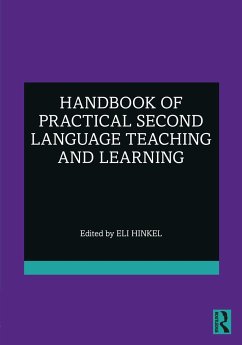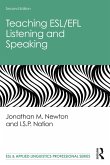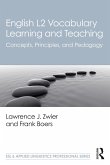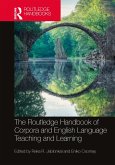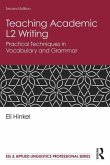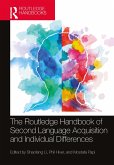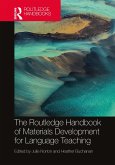This authoritative volume is a practical, comprehensive, and state-of-the-art overview of current knowledge and research on second and foreign language teaching and learning.
Thorough and reader-friendly, the Handbook is organized logically into six parts that address all major areas of L2/FL teaching and learning:
Part I: Learning Contexts and Language Teaching covers the diverse populations of language learners, their needs, and the challenges they face
Part II: Curriculum and Instruction addresses curriculum and materials design, and includes exemplars of instructional approaches with wide applicability across contexts
Part III: Listening and Speaking overviews listening pedagogy, speaking skills, and pronunciation, among other key topics
Part IV: Reading and Writing includes chapters on all practical matters related to learning to write in another language, with attention to spelling, orthography, extensive reading, and more
Part V: Vocabulary and Grammar discusses assumptions and practical approaches on vocabulary and grammar instruction, with attention to important topics such as academic writing and multiword expressions
Part VI: Intercultural Communication and Pragmatics concludes the Handbook with an examination of language learning across social, cultural, and regional differences
Bringing together leading experts in the field, the contributors offer important perspectives on major, established, and emerging topics. Each chapter overviews important developments, key research, and considerations and applications for effective second language instruction. A well-rounded, readable, and up-to-date resource, the Handbook is a compendium of the ongoing changes, innovations, and practices in L2/FL teaching and learning. It is an essential resource for students, teachers, faculty, and professionals.
Thorough and reader-friendly, the Handbook is organized logically into six parts that address all major areas of L2/FL teaching and learning:
Part I: Learning Contexts and Language Teaching covers the diverse populations of language learners, their needs, and the challenges they face
Part II: Curriculum and Instruction addresses curriculum and materials design, and includes exemplars of instructional approaches with wide applicability across contexts
Part III: Listening and Speaking overviews listening pedagogy, speaking skills, and pronunciation, among other key topics
Part IV: Reading and Writing includes chapters on all practical matters related to learning to write in another language, with attention to spelling, orthography, extensive reading, and more
Part V: Vocabulary and Grammar discusses assumptions and practical approaches on vocabulary and grammar instruction, with attention to important topics such as academic writing and multiword expressions
Part VI: Intercultural Communication and Pragmatics concludes the Handbook with an examination of language learning across social, cultural, and regional differences
Bringing together leading experts in the field, the contributors offer important perspectives on major, established, and emerging topics. Each chapter overviews important developments, key research, and considerations and applications for effective second language instruction. A well-rounded, readable, and up-to-date resource, the Handbook is a compendium of the ongoing changes, innovations, and practices in L2/FL teaching and learning. It is an essential resource for students, teachers, faculty, and professionals.

